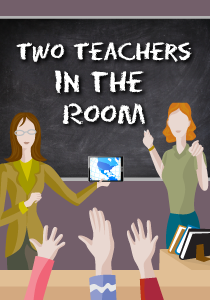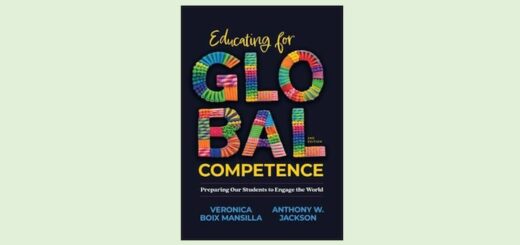What Co-Teachers Have to Be Thankful For
A MiddleWeb Blog
 By Elizabeth Stein & Laurie Wasserman
By Elizabeth Stein & Laurie Wasserman
Thanksgiving is right around the corner. The season begins at that crazy “OMG, the holiday is coming!” pace, and then…some nice, deep relaxing breaths. To celebrate one of our favorite holidays here in the USA, in the fall of 2012 we asked bloggers Elizabeth Stein and Laurie Wasserman to share some of the things they were thankful for in their work as special education co-teachers.
Thankful to learn from others
Elizabeth Stein: I’m thankful when I learn from my students. And I learn from them every day. I learn how to teach them by carefully observing and listening to what they say and how they interact. So, for example, when I see a student who remains quiet during all class discussions, I offer him the job of calling on peers to answer a question, or give him the job of paraphrasing some key ideas. And before I know it, he begins to actively participate on his own. Or when I see a student who never takes notes during class discussions, I make sure to provide strategies that guide his listening and note-taking abilities.
Laurie Wasserman: I too am grateful for what I learn from my students. I go home some nights physically and emotionally exhausted because our students have so much on their plates, and yet they leave school with big grins, wishing me a great afternoon or weekend. Several of my students live with wonderful grandparents, the unsung heroes in their life because their parents have died, sometimes in horrific circumstances. These committed guardians call and e-mail us to keep on top of things in their grandkids’ lives; they are their biggest cheerleaders. And I learn so much about courage and resiliency from their grandchildren, our students.
Thankful we can grow and help
Elizabeth: I’m thankful when I have opportunities to grow. And, let’s face it, the opportunities are endless! I grow every time I enter one of my inclusion classrooms. I strengthen my personal teaching behaviors as I go with the flow of co-teaching moments. In addition, I grow as I participate in various professional development and leadership opportunities. I make sure to continue my own personal and professional growth, so that I will be able to do the same for my students.
Laurie: I’m thankful for MiddleWeb for providing this co-teaching blog to help other teachers out there who need to know that they’re not alone in this important work. And I’m grateful for Elizabeth, who inspires me with her ideas and stories from her New York school.
Thankful for high expectations
Elizabeth: I’m thankful when high standards and rigorous curricula inspire and guide students with learning disabilities to compensate – and then succeed and achieve at their personal best. When we have high expectations for our students, and show them we believe in them, they often reach higher levels of performance. This limits that “learned-helplessness” attitude that plagues far too many students, unnecessarily.
Thankful for good leaders
Elizabeth: I’m thankful when co-teachers collaborate and administrators support this collaboration. The strongest collaborative relationships result from open minded folks who commit themselves to communicate and perform consistently. Administrators can do so much to support the consistency of planning time and professional development opportunities.
Laurie: I’m thankful to have a principal and assistant principal who never forget what it was like to be a teacher. They will drop everything to take a walk with a student I’m worried about who just needs a “fireside chat,” a few words of wisdom to redirect them, or simply a firm, “Is that really a good choice for you to make?” They believe in us as teachers, trust in our judgment, and give us validation and professional back up when we need it.
Thankful for teacher partnership
Laurie: I’m thankful when my teammates are true teaching partners. There’s my math colleague, who takes my crazy ideas like “free throw basketball shots” and teaches kids how to figure out the complicated process of changing fractions to decimals and percents. And my ELA partner, who gets the kids moving and shaking during class whether it’s using an activity adapted from the “A Minute to Win It” TV show for test review or modifying his lessons and tests as needed for the kids.
There’s my teammate who tells stories in Ancient World History and creates alternative assessments — 3D models of Greek Gods and Goddesses, maps of Mesopotamia — and so much more. And there’s our new substitute science teacher, so open to any idea, suggestion or teaching strategy. She’s an eager student herself, learning how to help all kids be successful. And our para, a second set of sharp eyes and ears; always sharing observations, worries and concerns so we can help the kids during academic support.
Thankful for technology
Elizabeth: I’m thankful when technology allows for all students to share their voice. Although many students struggle with reading and writing, they are capable and knowledgeable in many ways. Many students have a deep background knowledge base on many subjects, but are not able to share what they know through writing. Technology provides tremendous supports. For example, we can set up programs that read to students as the text is highlighted on their computer screen. In addition, word processing support tools guide students to get their thoughts on paper.
Thankful for growing self-esteem
Elizabeth: I’m thankful when I see students’ self-esteem improve (and sometimes soar) as a result of solid partnerships between teachers, students, and parents. A solid bridge between the home and school environment usually results in positive outcomes for students. Students feel the support in every direction—and they begin to take risks and become more independent academically and/or socially.
Thankful for acceptance
Elizabeth: I’m thankful when general education students display the awareness and acceptance to include and support their peers in the learning process. Peer acceptance is a tricky topic for any student—especially at the middle and high school levels. When we throw in the hurdles that students with disabilities must deal with, the school experience can become filled with anxiety. When co-teachers set the stage well, the classroom environment is a positive one, and all students are accepted, supported, and respected. Teachers serve as role models for addressing learning differences. Students are more apt to positively interact and support one another when teachers create a risk-free, accepting learning environment.
Thankful for kindness & caring
Laurie: I think how much I learn about kindness and caring from our students. They are the reason I often wake up before the alarm goes off. They make me want to be a better teacher. Just recently, a student who had repeated 5th grade because someone thought he wasn’t mature enough — said in math class, “Ms. Wasserman, would you like me to help Walt so you can help someone else?” Wow, a 12-year-old who is mature beyond his years. Thankfully, we can all learn from that.
___________________________
(Bios updated 11/20/17)
 Elizabeth Stein is a 25-year teaching veteran, specializing in literacy and special education, with experience in both upper elementary and middle school. She’s currently a co-teaching coach in Long Island NY’s Smithtown Central School District. Elizabeth is National Board Certified in Literacy and a contributor to Education Week and other publications. Her latest book, Two Teachers in the Classroom: Strategies for Co-Teaching Success (Routledge/MiddleWeb) was published in Fall 2017.
Elizabeth Stein is a 25-year teaching veteran, specializing in literacy and special education, with experience in both upper elementary and middle school. She’s currently a co-teaching coach in Long Island NY’s Smithtown Central School District. Elizabeth is National Board Certified in Literacy and a contributor to Education Week and other publications. Her latest book, Two Teachers in the Classroom: Strategies for Co-Teaching Success (Routledge/MiddleWeb) was published in Fall 2017.
 Laurie Wasserman recently retired as a National Board Certified 6th-grade special needs teacher in Medford, Massachusetts, after teaching for 35 years. She has written articles for Education Week, Teacher Magazine and Education World, and is also a co-author of the 2011 book Teaching 2030: What We Must Do for Our Students and Public Schools Now and in the Future. She now works for Beyond BookSmart as an executive function coach for students in the Boston area.
Laurie Wasserman recently retired as a National Board Certified 6th-grade special needs teacher in Medford, Massachusetts, after teaching for 35 years. She has written articles for Education Week, Teacher Magazine and Education World, and is also a co-author of the 2011 book Teaching 2030: What We Must Do for Our Students and Public Schools Now and in the Future. She now works for Beyond BookSmart as an executive function coach for students in the Boston area.



































What a great post! It gave me a lot to think about, and to realize that I need to be thankful for. I’m thankful for you gals! :-)